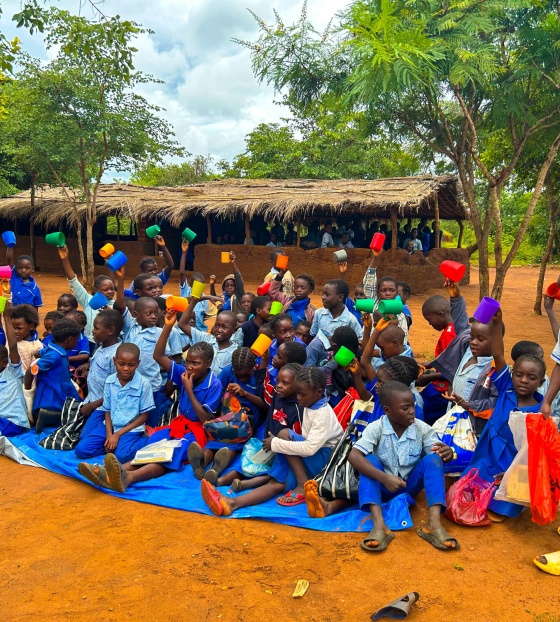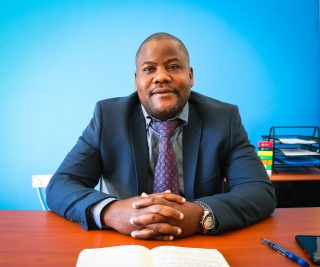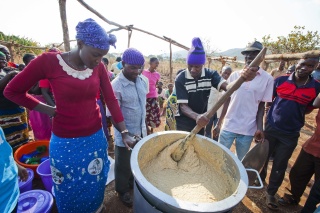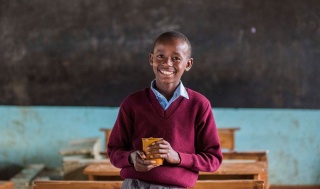

It takes many villages: running a global programme on a volunteer-based model
One size doesn’t fit all, but we are all united with a common goal.
Across many different countries, environments, and cultures, one size rarely fits all, so we start on the basis that every community gives what they can, recognising that this looks different in every location and context.
We see these contributions as acts of love that make this work possible, mirroring the acts of love from volunteers and donors raising awareness and funds across the world to support our work.

Panji has worked for Mary’s Meals for more than a decade and currently leads our work in Zambia and Zimbabwe as country director.
He says: “Engaging community volunteers to run the programme helps to keep costs low but, more important than that, community empowerment makes the programme more effective and sustainable, which is why our volunteer-led model is so important.
“The Mary’s Meals model relies on partnership rather than handouts, which some people might not be used to. So, you need to build up trust with people.
“It is the same with recruiting volunteers. You don’t just go to a village, blow a whistle and the volunteers come.
“Community hinges on the leadership. If you can mobilise the leaders, then you leave everything to them.”
Why community ownership matters
It’s essential the community has ownership of the school feeding programme and takes responsibility for the day-to-day running of it over the long-term.
While the contributions a community can realistically make will vary in scope, size or regularity, there are some significant elements that they must sign up to in a formal agreement before the programme can be introduced.
These include:
-
Time – we need a commitment of time from the cooks who prepare and serve the school meals, and the School Feeding Committee members who complete tasks such as coordinating a volunteer rota and stock monitoring.
-
Materials – this includes mobilising water and providing cooking fuel. Where possible, communities also contribute supplementary ingredients if they have a school garden and help with the construction of a school kitchen and store.
-
Security – we need agreement from the School Feeding Committee that they will ensure the security of stock and equipment.
From the outset of our partnership, we agree with each community that they are expected to contribute as much as they can – and their capacity to do so should be reviewed over time.
We do not prescribe the level or type of contribution that should be made because we trust in the innate goodness of community members to give what they can to support their children in school, and we fundamentally believe that the school feeding programme belongs to each local community.
Panji says: “When you introduce the programme, there is that excitement and people come forward. You need to maintain momentum though.
“So, you engage in continuous communication and keep talking to community leaders. People listen more to their local leaders than they listen to us.”
With genuine ownership of the programme, communities are much more empowered to find solutions to these challenges.

How to work together for the future
Trust and mutual respect are ever-present in our relationship with schools and communities, and they are built to last.
However, we also have a responsibility to ensure that schools and communities have the knowledge, skills, equipment and support they need to implement and maintain the programme successfully long term.
Panji says: “Ultimately, we want there to be no need for Mary’s Meals, but until that’s possible, it’s about supporting the practical running of the programme and capacity building within the community.
“Empowering the community is essential and that happens through effective support. Our school feeding officers and delivery partners visit schools regularly to help maintain good practice, monitor project implementation, and help identify solutions to problems.
“I tell my team – every time you have a meeting with the community, ask them ‘do you still want this programme?’ because without them it will not work.”
It’s not just the Mary’s Meals teams that invest in and think about the long term, the communities we partner with do too. As a result, the school feeding programmes are strong and set up to last.
It’s precisely the small acts undertaken by many thousands of people every day that keep our school feeding programme running, giving hope to more than 2.4 million vulnerable children every school day.
There are lots of ways you can help Mary’s Meals in your own area or through your own networks. To find out more, get involved!
